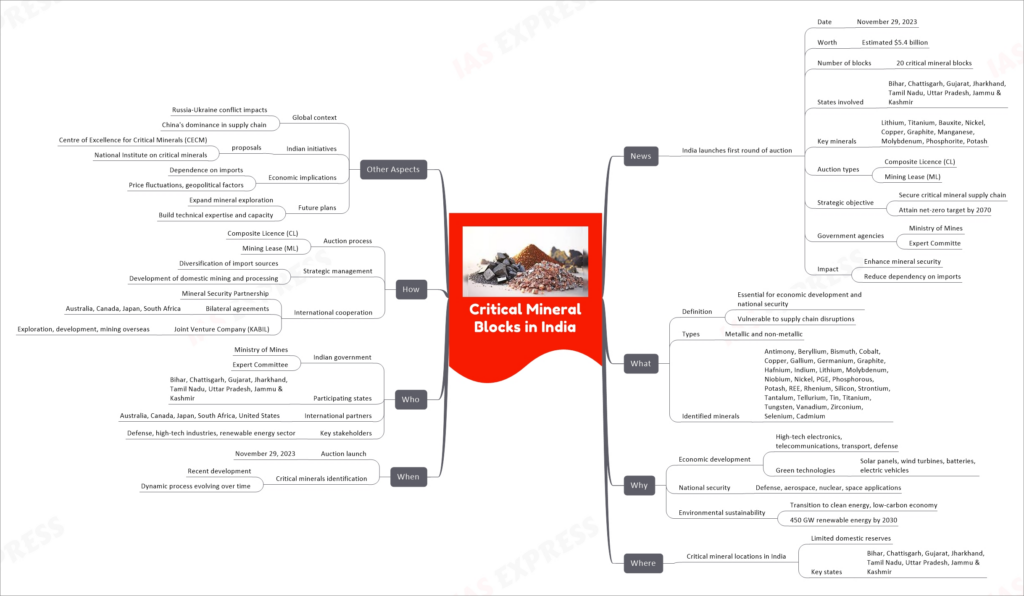Critical Mineral Blocks in India
Introduction: In a significant move towards securing its critical mineral supply chain and achieving its net-zero emissions target by 2070, India recently launched its first round of auction for 20 critical mineral blocks on November 29, 2023. With an estimated worth of $5.4 billion, this auction has garnered attention due to its potential impact on various sectors, including economic development, national security, and environmental sustainability.
News
- Date: The auction took place on November 29, 2023.
- Worth: The estimated value of the auction stands at $5.4 billion.
- Number of Blocks: India auctioned off 20 critical mineral blocks.
- States Involved: The auction covered states like Bihar, Chattisgarh, Gujarat, Jharkhand, Tamil Nadu, Uttar Pradesh, and Jammu & Kashmir.
- Key Minerals: The critical mineral blocks include minerals like Lithium, Titanium, Bauxite, Nickel, Copper, Graphite, Manganese, Molybdenum, Phosphorite, and Potash.
- Auction Types: The blocks were offered under two categories – Composite Licence (CL) and Mining Lease (ML).
- Strategic Objective: The primary goal of this auction is to secure the critical mineral supply chain and work towards India’s net-zero emissions target by 2070.
- Government Agencies: The Ministry of Mines and an Expert Committee oversee the auction.
- Impact: This initiative aims to enhance mineral security and reduce India’s dependency on imports, contributing to economic growth and sustainability.
What
- Definition: Critical minerals are essential for economic development and national security. They are vulnerable to supply chain disruptions.
- Types: These minerals are categorized into metallic and non-metallic.
- Identified Minerals: India has identified a wide range of critical minerals, including Antimony, Beryllium, Bismuth, Cobalt, Copper, Gallium, Germanium, Hafnium, Indium, Lithium, Molybdenum, Niobium, Nickel, PGE, Phosphorous, Potash, REE, Rhenium, Silicon, Strontium, Tantalum, Tellurium, Tin, Titanium, Tungsten, Vanadium, Zirconium, Selenium, and Cadmium.
Why
- Economic Development: Critical minerals play a crucial role in high-tech electronics, telecommunications, transportation, and defense industries. They are also essential for green technologies such as solar panels, wind turbines, batteries, and electric vehicles.
- National Security: These minerals are vital for defense, aerospace, nuclear, and space applications, making them integral to India’s national security.
- Environmental Sustainability: Critical minerals are pivotal for transitioning to clean energy and building a low-carbon economy. They are instrumental in achieving India’s target of 450 GW of renewable energy by 2030.
Where
- Critical Mineral Locations in India: India has limited domestic reserves, and the key states involved in critical mineral production include Bihar, Chattisgarh, Gujarat, Jharkhand, Tamil Nadu, Uttar Pradesh, and Jammu & Kashmir.
When
- Auction Launch: The auction was officially launched on November 29, 2023.
- Critical Minerals Identification: Identifying critical minerals is an ongoing, dynamic process that evolves over time.
Who
- Indian Government: The Ministry of Mines and an Expert Committee oversee the auction process.
- Participating States: Bihar, Chattisgarh, Gujarat, Jharkhand, Tamil Nadu, Uttar Pradesh, and Jammu & Kashmir actively participate.
- International Partners: India collaborates with countries like Australia, Canada, Japan, South Africa, and the United States.
- Key Stakeholders: This initiative impacts defense, high-tech industries, and the renewable energy sector.
How
- Auction Process: The auction offers critical mineral blocks under two categories: Composite Licence (CL) and Mining Lease (ML).
- Strategic Management: India aims to diversify its import sources and develop domestic mining and processing capabilities.
- International Cooperation: India engages in the Mineral Security Partnership and has bilateral agreements with Australia, Canada, Japan, and South Africa. The Joint Venture Company (KABIL) explores and develops mineral resources overseas.
Other Aspects
- Global Context: India’s efforts to secure critical minerals are influenced by factors such as the Russia-Ukraine conflict and China’s dominance in the supply chain.
- Indian Initiatives: India has proposed to create the Centre of Excellence for Critical Minerals (CECM) and the National Institute on critical minerals to bolster its capabilities.
- Economic Implications: Dependence on imports can lead to price fluctuations and geopolitical risks.
- Future Plans: India plans to expand mineral exploration and build technical expertise and capacity in the critical minerals sector.
Conclusion: India’s auction of critical mineral blocks marks a significant step towards achieving mineral security, economic development, national security, and environmental sustainability. This initiative reflects the nation’s commitment to reducing dependency on imports and contributing to a cleaner, more secure future.
If you like this post, please share your feedback in the comments section below so that we will upload more posts like this.


